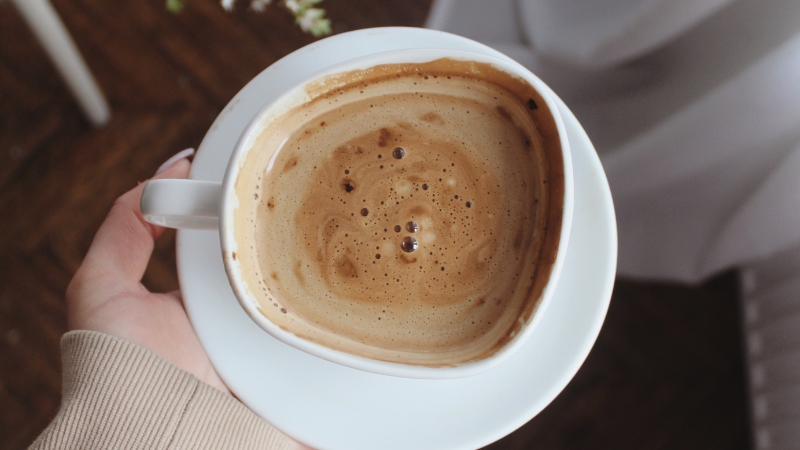Last Tuesday, I sat in my car at 4 PM, holding my third cup of coffee and wondering why I felt so anxious. My heart raced, my hands trembled slightly, and I knew I would be tossing and turning until 2 AM again.
How long does caffeine stay in your system is a question that hits close to home for so many of us, especially when we realize that our morning coffee can still be affecting our bodies 12 hours later.
In the following sections, you will discover exactly how your body processes caffeine, learn why your friend can drink espresso after dinner while you cannot have tea past noon, and find compassionate strategies to work with your unique biology for better energy and restful sleep.
The Story of Caffeine in Your Body

Caffeine half half-life means the time your body needs to eliminate half of the caffeine you consume. According to Dr. Roland Griffiths, who spent decades studying caffeine at Johns Hopkins University, “the average person takes 5 to 6 hours to metabolize half their caffeine intake, but individual differences can range from 2 to 12 hours.”
Your body requires multiple cycles to completely clear caffeine from your system.
The metabolism of caffeine happens primarily in your liver through an enzyme called CYP1A2. According to research published in the Journal of Clinical Pharmacology, genetic variations in the enzyme explain why some people metabolize caffeine quickly while others process it slowly.
If you have always wondered why your sister can drink coffee at 8 PM and sleep soundly while you feel wired from afternoon tea, genetics likely holds the answer.
Caffeine in the bloodstream levels reach their peak within 30 to 60 minutes after you take that first sip. According to Dr. Mary Sweeney, a caffeine researcher at Johns Hopkins, “caffeine crosses the blood-brain barrier easily, where it blocks adenosine receptors.” Adenosine is your body’s natural sleepiness signal, so caffeine essentially tells your brain to ignore fatigue.
The complete journey of how long caffeine lasts depends on factors beyond genetics. According to the American Journal of Clinical Nutrition, body weight, age, pregnancy, and even birth control pills significantly alter caffeine metabolism.
Women taking oral contraceptives metabolize caffeine 30% slower than those not using hormones, which explains why some women feel more caffeine-sensitive during certain times.
Your body typically needs 12 to 24 hours to eliminate caffeine. However, according to sleep researchers at Harvard Medical School, sensitive individuals may feel effects for up to 48 hours after consumption. Even small amounts can disrupt sleep patterns when consumed within 6 hours of bedtime.
Why Your Caffeine Experience is Uniquely Yours
View this post on Instagram
How fast caffeine wears off varies dramatically between people, and there is no shame in being more sensitive than others. Age plays a significant role, with older adults metabolizing caffeine more slowly. According to research from the Sleep Research Society, adults over 65 may need up to 8 hours to process the same amount of caffeine that a 25-year-old clears in 4 hours.
Pregnancy creates dramatic changes in caffeine metabolism. According to Dr. Jennifer Wu, an obstetrician at Lenox Hill Hospital, “pregnant women metabolize caffeine 2 to 3 times slower than non-pregnant women, especially during the third trimester.” The caffeine half-life can extend to 15 hours or more during late pregnancy, making that morning cup much more impactful.
Liver health significantly impacts when caffeine leaves your body. According to hepatology research, people with liver conditions or those taking certain medications may experience prolonged caffeine effects. Common medications that slow caffeine metabolism include some antibiotics, antidepressants, and heart medications.
Interestingly, smoking accelerates caffeine metabolism by up to 50%. According to pharmacokinetic studies, smokers typically clear caffeine faster than non-smokers, which explains why some heavy smokers consume large amounts of coffee without apparent sleep disruption. Conversely, certain foods can slow caffeine metabolism, particularly grapefruit and cruciferous vegetables.
Caffeine sensitivity and duration also depend on your consumption patterns. According to the European Food Safety Authority, people who consume caffeine daily develop tolerance, requiring higher doses to achieve the same effects. However, tolerance does not affect metabolism speed, so regular coffee drinkers still experience the same duration of effects.
Body composition influences caffeine metabolism as well. According to nutrition research, people with higher body fat percentages may experience longer-lasting effects because caffeine is fat-soluble. Additionally, dehydration can prolong caffeine effects by reducing liver metabolism efficiency.
Factor
Impact on Caffeine Duration
Typical Change
Age (over 65)
Slower metabolism
50-100% longer
Pregnancy
Significantly slower
200-300% longer
Liver conditions
Much slower
Highly variable
Smoking
Faster metabolism
50% shorter
Oral contraceptives
Slower metabolism
30% longer
Body composition
Variable effects
10-20% difference
Hour by Hour Journey

The caffeine effects timeline begins within minutes of consumption and follows a predictable pattern. According to Dr. Roland Griffiths, “caffeine reaches peak blood concentration within 30 to 60 minutes, but you may start feeling effects within 15 minutes.”
Here is what happens in your body:
- Hour 1: Caffeine absorption begins immediately in your stomach and small intestine. You start feeling more alert and focused as adenosine receptors become blocked. According to cardiovascular research, heart rate may increase slightly, and many people experience improved mood and motivation.
- Hours 2-4: Peak effects occur during this timeframe. Concentration, alertness, and physical performance reach their maximum. According to sports medicine research published in the International Journal of Sport Nutrition, athletic performance improvements are most pronounced during the window. Many people experience increased metabolism and slight appetite suppression.
- Hours 5-8: The caffeine half-life phase begins. Effects gradually diminish as your liver metabolizes approximately half the caffeine. According to sleep medicine research, sleep quality can still be significantly impacted if bedtime occurs during the timeframe, even if you do not feel actively stimulated.
- Hours 9-12: Most people have metabolized 75% of their caffeine intake. However, how long before caffeine wears off completely depends on your factors. According to pharmacology studies, sensitive individuals may still feel effects, particularly if they consumed large amounts or multiple doses throughout the day.
- Hours 13-24: Complete elimination occurs for most people. According to neurochemistry research, your adenosine receptors return to normal function, and natural sleepiness patterns resume. However, regular caffeine users may experience withdrawal symptoms during the period, including headaches and fatigue.
According to research published in the Journal of Clinical Sleep Medicine, caffeine and sleep disruption can occur even when people do not feel actively stimulated.
Sleep architecture changes, including reduced deep sleep and increased sleep fragmentation, can persist for 6 to 8 hours after the last dose.
The Truth About Caffeine Buildup
Does caffeine build up in your system with regular consumption? According to pharmacokinetic studies, caffeine does not accumulate in your body over days or weeks because it is completely metabolized within 24 hours in healthy individuals. However, regular consumption creates physiological changes that feel like buildup.
According to Dr. Laura Juliano, a psychology professor at American University, “chronic caffeine use results in increased adenosine receptor density, which means you need more caffeine to achieve the same blocking effect.” The adaptation creates the need for higher doses over time, not actual caffeine accumulation.
Caffeine duration in body remains consistent regardless of tolerance. According to clinical research, a regular coffee drinker still metabolizes caffeine at the same rate as someone who drinks it occasionally. The difference lies in perceived effects, not actual caffeine presence in the bloodstream.
Withdrawal symptoms can create the illusion of caffeine buildup. According to research in the journal Psychopharmacology, regular caffeine users experience withdrawal symptoms within 12 to 24 hours of their last dose. Headaches, irritability, and fatigue make people feel like they need caffeine to function normally.
According to Dr. Kenneth Silverman from Johns Hopkins, “caffeine tolerance and dependence resolve naturally within 7 to 12 days of abstinence.” Most withdrawal symptoms peak within 2 to 3 days and resolve completely within one week, which can be reassuring for those wanting to reduce their intake.
Some people report feeling like caffeine effects last longer after extended periods of heavy use. According to sleep research, the phenomenon likely relates to disrupted sleep patterns and accumulated sleep debt rather than actual caffeine accumulation. Poor sleep quality can make people feel sluggish and dependent on caffeine for basic function.
Creating Your Caffeine Strategy
How long does it take caffeine to wear off enough to not disrupt sleep? According to a landmark study published in the Journal of Clinical Sleep Medicine, caffeine consumed 6 hours before bed reduced sleep time by more than one hour. Sleep researchers recommend stopping caffeine consumption at least 6 hours before bedtime.
The timing becomes even more important for sensitive individuals. According to Dr. Matthew Walker, a sleep researcher at UC Berkeley, “caffeine-sensitive people should avoid all caffeine after 2 PM if they plan to sleep by 10 PM.” The conservative approach accounts for individual variations in metabolism and sensitivity.
Caffeine and sleep disruption occurs through multiple mechanisms beyond simple alertness. According to sleep architecture studies, caffeine reduces the amount of deep sleep, which is crucial for physical recovery and memory consolidation. Even if you fall asleep after consuming caffeine, sleep quality may be compromised without your awareness.
Strategic timing can help you enjoy caffeine benefits without sleep consequences. According to chronobiology research, consuming caffeine within 2 hours of waking enhances natural cortisol rhythms and improves morning alertness. Avoiding caffeine after lunch helps preserve natural sleepiness signals in the evening.
Alternative strategies include switching to lower-caffeine options in the afternoon. According to nutrition data, green tea contains about 25mg of caffeine per cup compared to 95mg in coffee. Some people find that the lower dose allows them to enjoy a warm beverage without severe sleep disruption.
When caffeine leaves your body depends partly on what you consume with it. According to nutrition research, consuming caffeine with food, especially protein, can slow absorption and create more sustained effects. The approach may help some people avoid afternoon crashes and reduce the temptation for late-day caffeine consumption.
Time of Day
Caffeine Impact
Sleep Quality Effect
Upon waking
Enhances alertness
Minimal to none
Mid-morning
Peak performance
Minimal to none
Afternoon (2-6 PM)
Moderate alertness
Moderate disruption
Evening (6-10 PM)
Slight alertness
Significant disruption
Night (after 10 PM)
Minimal alertness
Severe disruption
Supporting Your Body Through Changes

Caffeine sensitivity and duration vary widely among individuals, and being sensitive is not a weakness or failure. According to research published in the journal Neuropsychopharmacology, approximately 10% of the population are “slow metabolizers” who process caffeine significantly slower than average.
Common signs of caffeine sensitivity include jitteriness, rapid heartbeat, anxiety, and difficulty sleeping after small amounts. According to Dr. Marilyn Cornelis, a caffeine researcher at Northwestern University, “genetic testing can identify slow metabolizers, but paying attention to your body’s response is more practical and affordable for most people.”
How long does caffeine stay in your system for sensitive individuals can extend beyond 24 hours. According to clinical guidelines, people with sensitivity should limit intake to early morning hours and consider switching to decaffeinated alternatives. Even small amounts of caffeine from chocolate or tea can cause problems for highly sensitive individuals.
Gradual reduction works better than sudden cessation for managing sensitivity. According to addiction specialists, reducing caffeine intake by 25% each week minimizes withdrawal symptoms and allows your body to readjust gradually. The approach prevents the severe headaches and fatigue that can accompany abrupt caffeine elimination.
Alternative sources of energy can help sensitive individuals reduce caffeine dependence. According to wellness research, regular exercise, adequate sleep, and proper hydration provide natural energy boosts without the side effects of caffeine. Some people find that B-vitamins or adaptogenic herbs like rhodiola provide sustained energy without jitters.
Caffeine duration in body can be influenced by other substances. According to pharmacological studies, alcohol can slow caffeine metabolism and extend its effects. Certain medications, particularly those processed by the same liver enzymes, can also prolong caffeine effects and increase sensitivity.
Your Path to Caffeine Harmony
@jameshoffmanncoffee I do believe tracking your caffeine for a short while can be interesting, as long as it doesn’t become an obsession. Have you ever done this yourselves? And if so, did you find it worth the experiment? #caffeine #coffee #tracking #tracker ♬ original sound – James Hoffmann
How long before caffeine wears off becomes less important when you time your intake strategically. According to chronobiology research, the key is working with your body’s natural rhythms rather than against them. Cortisol levels naturally peak in the morning, making early caffeine consumption most effective for most people.
Creating a caffeine schedule based on your personal metabolism helps optimize benefits. Track how you feel at different times after consumption and adjust accordingly. According to behavioral research, some people find that consuming caffeine every other day prevents tolerance buildup and maintains effectiveness.
Caffeine effects timeline awareness helps you plan important activities. According to productivity research, schedule demanding tasks during peak caffeine hours (1-4 hours after consumption) and avoid caffeine before activities requiring calm focus, such as meditation or creative work.
Consider your individual goals when planning caffeine use. According to lifestyle research, athletes might time consumption before workouts, students might use it strategically before exams, and parents might need morning caffeine for energy but avoid afternoon consumption to prevent sleep disruption.
Remember that optimal caffeine use is deeply personal. According to behavioral studies, what works for your friend or colleague may not work for you. Pay attention to your body’s signals and adjust accordingly. The goal is to enhance your life, not create dependence or anxiety.
Caffeine and sleep disruption can be minimized through mindful consumption. According to sleep hygiene research, setting a daily cutoff time and sticking to it helps maintain healthy sleep patterns. Many people find that having a specific routine, such as switching to herbal tea after lunch, creates positive associations and reduces cravings.
Your journey to optimal caffeine use deserves patience and self-compassion. According to wellness psychology, small adjustments often lead to significant improvements in energy, sleep quality, and overall well-being. Be gentle with yourself as you discover what works best for your unique body and lifestyle.



